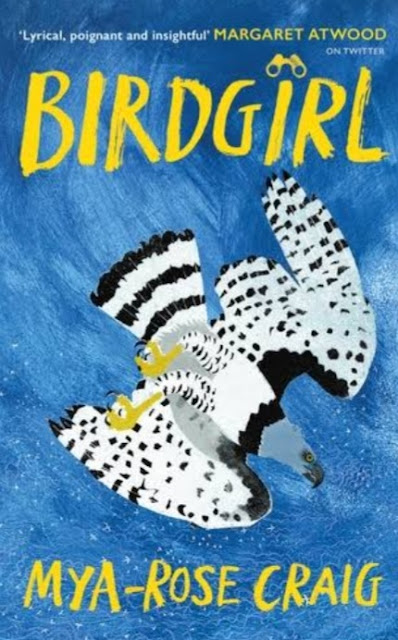Birdgirl: Looking to the Sky for a Better Future by Mya-Rose Craig - A Memoir- forthcoming March 28,2023
"Birdwatching has never felt like a hobby, or a pastime I can pick up and put down, but a thread running through the pattern of my life, so tightly woven in that there’s no way of pulling it free and leaving the rest of my life intact.”
Birdgirl is a very powerful deeply moving memoir by a twenty year old woman.The focus is on how a love of birdwatching, called "twitching" in England, lead her to a deep interest in conservation and climate issues. Interwoven with this is her story of growing up dealing with her mother's serious mental health problems, she was bipolar. Her mother was from Bangladesh and her father English which impacted her life in a society with biases against minorities.
Mya-Rose Craig began birdwatching at eight, starting with her father, she became obsessed with birds, seeing them, listing her sightings on birding website and becoming at 17 to be the youngest person to have seen over 5000 species of birds, half of the estimated 10,000 in the world. Her mother, a solicitor, had extreme mood swings. Growing up Mya-Rose did not understand the causes of this but she came to look for down turns which might keep her mother feeling like doing nothing all day to be as inexplicably to her up moods when her mother would work 12 hours a day, then come home and plan bird watching trips.
Each chapter begins with a description of a bird she hopes to see. I learned a lot about birds, their environments, birding lodges (for fun I followed a few lodges on Facebook)
Her family had the resources to go on lengthy birdwatching trips all over the world. They spent three months touring twitching hot spots in South America. Her mother planned the trips and Mya-Rose noticed her mother, who was also an obsessive twitcher, seemed better on trips. I learned birdwatching was a competitive pursuit as well as a community building activity.
Mia-Rose began to get noticed by British media. At 13 she was giving speeches all over England, she became involved in environmental causes along with Greta Thunburg. She was trying hard to fit in as a young teenager with her age peers. We see the struggles to find help for her mother. The mother's issues emotionally strained the father. She begins a program to get more minorities involved in birdwatching.
I am very glad to close out this year on The Reading Life with such an interesting and inspiring memoir. If Mya-Rose Craig can pack so much in just 20 years I know she will be a powerful force for the good of the earth.
"I am a 20-year-old prominent British-Bangladeshi ornithologist, environmentalist, diversity activist as well as an author, speaker and broadcaster. At age 11 I started the popular blog Birdgirl, and at age 17 I became the youngest person to see half of the birds in the world" from.https://www.birdgirluk.com/
For more about her amazing accomplishments I refer you to her website.
From Amazon
"Mya-Rose Craig, also known as Birdgirl, is a 20-year-old British-Bangladeshi birder, environmentalist, and diversity activist. She campaigns for equal access to nature, to end the climate and biodiversity loss crises, issues which she believes are intrinsically linked, while promoting Global Climate Justice. She also fights for the rights of indigenous peoples, is an Ambassador for Survival International and has previously written a book in the UK amplifying their voices.
At age fourteen she founded Black2Nature, to engage teenagers of color with nature and at seventeen she became the youngest Briton to receive an honorary Doctorate, awarded by Bristol University for this pioneering work. Also at seventeen she became the youngest person to see half the world's bird species and shared a stage with Greta Thunberg, speaking to 40,000 protestors. In September 2020 she held the world's most northerly Youth Strike, traveling with Greenpeace, for whom she is an Oceans' Ambassador, to the melting pack ice of the high Arctic."
Mel Ulm















